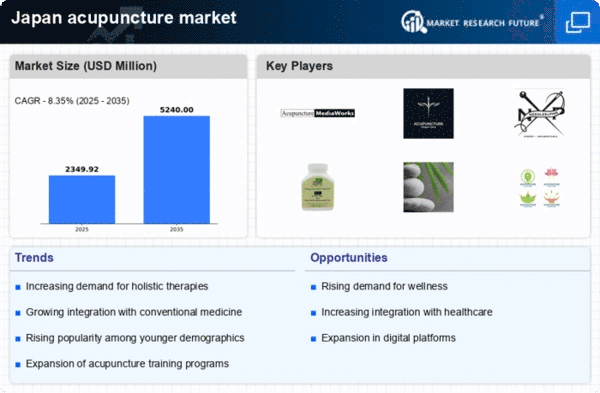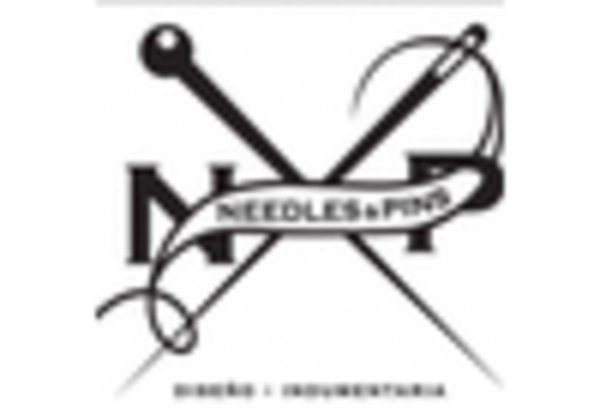Government Support for Traditional Medicine
Government initiatives aimed at promoting traditional medicine practices, including acupuncture, are influencing the acupuncture market in Japan. The Japanese government has recognized the importance of integrating traditional therapies into the healthcare system, providing funding and resources for training practitioners. This support is reflected in the establishment of educational programs and certification processes for acupuncturists. Furthermore, the government has been actively encouraging research into the efficacy of acupuncture, which may lead to increased acceptance among healthcare professionals. As a result, the acupuncture market is likely to benefit from enhanced legitimacy and a broader patient base, potentially increasing its share of the overall healthcare market.
Cultural Acceptance of Alternative Therapies
Cultural factors play a significant role in shaping the acupuncture market in Japan. The long-standing tradition of using alternative therapies, including acupuncture, has fostered a favorable environment for its practice. Many Japanese individuals view acupuncture as a legitimate and effective treatment option, which contributes to its widespread acceptance. This cultural inclination towards holistic health practices is likely to drive demand for acupuncture services. Additionally, the increasing integration of acupuncture into wellness programs and corporate health initiatives further enhances its visibility and accessibility. As cultural acceptance continues to grow, the acupuncture market may experience sustained growth, appealing to a broader demographic.
Increasing Awareness of Acupuncture Benefits
The growing awareness of the benefits associated with acupuncture is a notable driver in the acupuncture market. As more individuals in Japan seek alternative therapies for pain management and overall wellness, the demand for acupuncture services is likely to rise. Educational campaigns and community workshops have contributed to this awareness, highlighting acupuncture's effectiveness in treating various conditions such as chronic pain, anxiety, and digestive issues. According to recent surveys, approximately 30% of the Japanese population has expressed interest in trying acupuncture, indicating a substantial potential market. This trend suggests that as awareness continues to spread, the acupuncture market may experience significant growth, attracting both new practitioners and patients.
Rising Healthcare Costs and Demand for Alternatives
The escalating costs of conventional healthcare in Japan are prompting many individuals to explore alternative treatment options, including acupuncture. As healthcare expenses continue to rise, patients are seeking cost-effective solutions for managing health issues. Acupuncture, often perceived as a more affordable option compared to traditional medical treatments, is gaining traction among cost-conscious consumers. Reports indicate that the acupuncture market has seen a growth rate of approximately 15% annually, driven by this shift in consumer behavior. This trend suggests that as more individuals prioritize affordability in their healthcare choices, the acupuncture market may continue to expand, attracting a diverse clientele.
Technological Advancements in Acupuncture Practices
Technological innovations are emerging as a key driver in the acupuncture market, transforming traditional practices. The introduction of advanced acupuncture devices and techniques, such as electro-acupuncture and laser acupuncture, is attracting a new generation of patients. These technologies not only enhance the efficacy of treatments but also improve patient comfort and experience. Furthermore, the rise of telehealth services has made acupuncture more accessible, allowing practitioners to reach clients remotely. As these technological advancements gain traction, they are likely to reshape the acupuncture market, potentially increasing its appeal among tech-savvy consumers and expanding its reach beyond traditional settings.

















